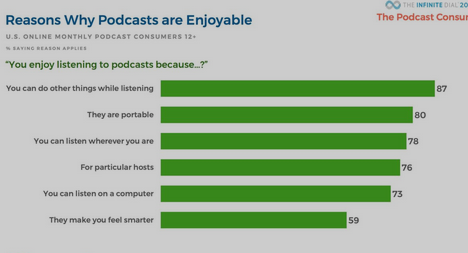Podcasts play a significant role in influencing consumer behavior by offering a unique and engaging platform for information, entertainment, and brand communication. Here are several ways in which podcasts impact consumer behavior:

Content Consumption and Education:
Podcasts provide a convenient way for consumers to access valuable content on various topics. Brands can use podcasts to educate consumers about their products, industry trends, and relevant information, influencing their understanding and decision-making.
Brand Awareness and Thought Leadership:
Brands that host podcasts or participate as guests can establish themselves as thought leaders in their industry. This helps build brand awareness and credibility, influencing consumer perceptions and preferences.
Storytelling and Emotional Connection:
Podcasts are an excellent medium for storytelling. Brands can share narratives, experiences, and testimonials that create emotional connections with consumers. Emotional resonance can influence purchasing decisions and brand loyalty.
Expert Interviews and Recommendations:
Podcasts often feature expert interviews and discussions. When experts recommend or endorse products/services, it can positively impact consumer trust and influence their decisions.
Product Reviews and Recommendations:
Podcasts dedicated to reviewing products or discussing industry trends can influence consumer purchasing decisions. Positive reviews and recommendations from podcast hosts or guests may drive interest and adoption.
Influencer Marketing:
Podcast hosts, especially those with a large and engaged audience, are considered influencers. Brands can leverage podcast influencers for sponsored content or endorsements, impacting their followers’ purchasing behavior.
Community Building:
Podcasts foster a sense of community among listeners who share common interests. Brands can tap into these communities to engage with their target audience, build relationships, and influence consumer loyalty.
Convenience and Multitasking:
Podcasts offer a convenient form of entertainment and education that fits into consumers’ busy lives. Many people listen to podcasts while commuting, exercising, or performing other tasks, making it an accessible channel to reach them.
Niche Targeting:
Podcasts cover a wide range of niche topics, allowing brands to target specific audiences with tailored content. This enables more precise and effective communication with a particular consumer segment.
Call-to-Action (CTA) Integration:
Podcasts can include effective calls-to-action, directing listeners to visit websites, sign up for newsletters, or take advantage of special offers. Well-crafted CTAs can drive consumer engagement and conversion.
Brand Personality and Tone:
The conversational nature of podcasts allows brands to showcase their personality and tone. This helps in building a unique brand identity that resonates with consumers and influences their perception.
Long-Form Content Engagement:
Unlike short-form content, podcasts offer long-form discussions, allowing brands to explore topics in-depth. This extended engagement can deepen the connection between the brand and the consumer.
Event Promotion and Sponsorship:
Podcasts often feature advertisements and sponsorships. Brands can leverage these opportunities to promote events, product launches, or special promotions, influencing consumer awareness and participation.
In summary, podcasts have become a powerful medium for brands to connect with consumers, share information, and influence behavior. The authenticity, storytelling, and personalization inherent in podcasts contribute to a more intimate and impactful relationship between brands and their audiences. As the podcasting landscape continues to grow, businesses can strategically incorporate podcasts into their marketing efforts to influence consumer behavior positively.
